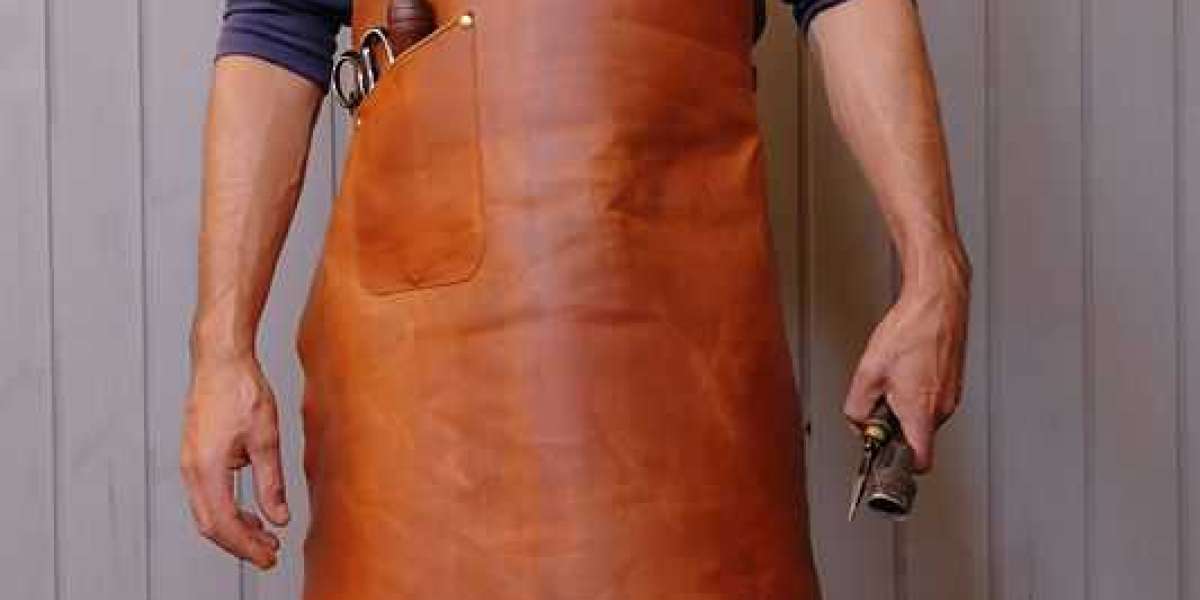Welding is a demanding and potentially hazardous profession, where safety and protection are paramount. One essential piece of safety gear in a welder’s toolkit is the leather apron. This article delves into the importance of leather aprons in welding, their benefits, types, and care tips to ensure they serve their purpose effectively.
Introduction to Welding Safety
Welding is a process that involves joining metals together using high heat and, in many cases, intense electrical currents. This creates several safety hazards, including exposure to extreme heat, ultraviolet radiation, and hot metal sparks. To mitigate these risks, welders must wear appropriate protective gear, and a leather apron is one of the most crucial pieces.
Importance of Safety Gear
Safety gear in welding is designed to protect the body from burns, UV radiation, and sparks. Without proper protection, welders are at risk of serious injuries. A leather apron helps shield the front of the body from flying sparks, molten metal, and heat, which are all common during welding tasks.
The Role of Leather Aprons in Welding
Leather aprons for welding have been a staple in the welding industry for decades due to their durability and protective qualities. The main role of a leather apron in welding is to provide a barrier between the welder and the hazardous elements involved in the process. Here’s why leather aprons are indispensable:
Protection from Heat and Sparks
Leather is an excellent heat-resistant material. It provides a substantial barrier against the high temperatures and molten metal that can occur during welding. The thick, dense nature of leather helps prevent burns and minimizes the risk of injury from hot splashes.
Durability and Longevity
The leather apron for welding is known for its toughness and durability. Unlike synthetic materials, leather can withstand the wear and tear associated with welding. It resists abrasion and tears, making it a long-lasting choice for welders who work in demanding environments.
Comfort and Flexibility
A well-designed leather apron offers both protection and comfort. Leather is flexible, allowing for a full range of movement, which is essential for welders who need to maneuver and work in various positions. Modern leather aprons are often lined with additional padding to enhance comfort during extended wear.
Types of Leather Aprons
Leather aprons come in various types, each with different characteristics suited to different welding needs. Understanding the types can help welders choose the best apron for their specific requirements.
Split Leather Aprons
Split leather is made from the lower layers of the cowhide, which are less expensive but still durable. Split leather aprons are a popular choice due to their affordability and reasonable protection. They offer good resistance to heat and are often used in less intensive welding environments.
Top Grain Leather Aprons
Top grain leather is obtained from the upper layers of the hide, making it more refined and durable than split leather. Top grain leather aprons provide superior protection and a more polished appearance. They are ideal for welders who require both high performance and aesthetic appeal.
Full Grain Leather Aprons
Full grain leather is the highest quality leather available, made from the top layer of the hide. It retains the natural texture and strength of the leather. Full grain leather aprons are exceptionally durable and provide excellent protection. They are often the choice for professional welders who need the best performance and longevity from their gear.
Features to Consider When Choosing a Leather Apron
Selecting the right leather apron involves evaluating several key features. Here’s what to consider:
Material Quality
The quality of leather directly impacts the apron’s performance. High-quality leather will be more resistant to heat and wear. Look for aprons made from genuine leather, and avoid synthetic alternatives that may not offer the same level of protection.
Thickness and Durability
The thickness of the leather affects its protective qualities. Thicker leather generally offers better protection but may be less flexible. Consider the type of welding you do and choose an apron that balances thickness with comfort.
Design and Comfort
Comfort is crucial for welders who wear aprons for extended periods. Look for aprons with ergonomic designs, adjustable straps, and padded areas to enhance comfort. Some aprons also feature pockets and tool holders for added convenience.
Adjustability and Fit
An apron that fits well will offer better protection and comfort. Adjustable straps allow for a customizable fit, ensuring the apron stays in place during welding. Check for aprons with multiple adjustment points to achieve a secure and comfortable fit.
How to Maintain Your Leather Apron
Proper maintenance ensures that your leather apron remains effective and lasts longer. Here’s how to care for your apron:
Cleaning Tips
Leather aprons should be cleaned regularly to remove debris and contaminants. Use a soft brush or cloth to wipe off dirt and dust. For more stubborn stains, a damp cloth with mild soap can be used. Avoid soaking the leather or using harsh chemicals.
Conditioning Leather
Leather conditioning helps maintain the material’s flexibility and prevents it from drying out or cracking. Apply a leather conditioner periodically to keep the leather soft and supple. Follow the manufacturer’s instructions for the best results.
Storage Practices
Store your leather apron in a cool, dry place to prevent mold and mildew. Avoid leaving it in direct sunlight or in areas with high humidity. Hanging the apron on a padded hanger can help maintain its shape and prevent creases.
Conclusion
A leather apron is an essential piece of protective gear for welders, offering crucial protection against heat, sparks, and molten metal. By understanding the different types of leather aprons and considering key features like material quality, thickness, design, and fit, welders can choose the best apron for their needs. Regular maintenance, including cleaning, conditioning, and proper storage, will ensure that your leather apron remains a reliable and durable component of your welding safety gear.
Choosing the right leather apron and caring for it properly can make a significant difference in your safety and comfort while welding. Whether you’re a professional welder or a hobbyist, investing in a high-quality leather apron is a smart decision for your safety and well-being.








